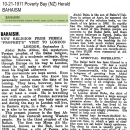Main menu
- ‘Abdu’l-Bahá’s Journey
- World Peace
- Stopping Racism in America
- Empowerment of Women
- More Principles...
- Prayer for America
Bahá’ísm
NEW RELIGION FROM PERSIA
“PROPHET’S” VISIT TO LONDON
LONDON, September 3.
‘Abdu’l-Bahá Abbas, the mysterious Persian prophet of the Bahá’í religion, which has, at a moderate estimate, three million followers, is now travelling through Europe on his way to London, where he will make a short stay and meet his English adherents.
His movements are kept secret. Even those few in London who know him personally cannot name the date of his coming. They have, however, been informed by cable that it will be very soon and that he will remain in London at least a week. He is travelling now with a suite of Persian secretaries and interpreters, and one body servant, and during the stay in London will live, in Eastern style, in a flat. A week or so is also to be spent in Paris.
This present journey is the first ‘Abdu’l-Bahá has ventured among Western people. He is the third prophet of the Bahá’ís. The first was Mirza Ali Mohammad, known as the Báb, born in 1819, in Shiraz, a city of Persia, who founded the great Bahá’í religious movement, and was shot at Tabriz, six years after he declared his mission. The mantle of the Báb descended upon a Persian nobleman, and second prophet, who became known as the Bahá’u’Uah, the Glory of God. He spent most of his years in banishment from Persia and in prison.
‘Abdu’l-Bahá is the son of Bahá’u’Uah. Born in prison at Acer, he assumed the leadership of the religious body, on the death of his father in 1892. So rapidly has the religion gained strength that now a third of the Persian people are converts to the Bahá’í faith, and there are many believers in Egypt, India, the United States, France and England. In the early days of the teaching its followers met with much violent persecution at the hands of their fellow Persian countrymen, and there are records showing that 20,000 wore massacred at different periods.
“A SPIRITUAL ESPERANTO.”
The Bahá’í faith has been likened to a spiritual Esperanto. “It has a world movement,” said the editor of the Christian Commonwealth, who has received a telegram of greeting from ‘Abdu’l-Bahá. “The characteristic of Bahá’ísm is that it seeks to demonstrate the fundamental unity of all religions, and to trace them all to one single Divine source. They seek to unite all faiths and religions as one.”
In London ‘Abdu’l-Bahá, the chief of the faith, should attract a large amount of public attention by his personal appearance alone. He is described by an English convert, who has lived in his house at Acre, as tall, with a slow, dignified carriage and kingly presence. His beard is long and white.
His snowy hair he wears doubled below a turban, which surmounts a strong clear-cut face, in which a pair of clear blue eyes are set below heavy eyebrows. The dress he dons is usually grey in color, a flowing tunic robe made of cotton, and sandals. Converts say that when present with him one does not want to talk, it is sufficient just to sit before him, and that his eloquence in addresses is beyond description. He speaks, however, in Persian, as his knowledge of English is limited to a few words.









